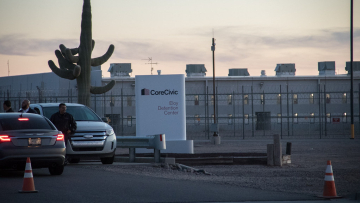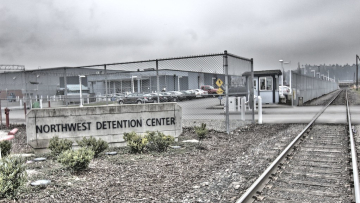UK human rights watchdog accepts complaints against Barclays and HSBC over private prison investments
Nico MacDonald, Worth Rises, press@worthrises.org
Ryan Brightwell, BankTrack, ryan@banktrack.org

Nico MacDonald, Worth Rises, press@worthrises.org
Ryan Brightwell, BankTrack, ryan@banktrack.org
Today, the United Kingdom’s National Contact Point (NCP) accepted complaints against UK-based banks Barclays and HSBC, filed by Worth Rises, The Northern Manhattan Coalition for Immigrant Rights (NMCIR) and BankTrack. The complaints allege that the banks have contravened their responsibilities under the OECD Guidelines on Responsible Business Conduct, by maintaining financial ties to CoreCivic and GEO Group, the largest private prison operators in the U.S., without taking steps to prevent or mitigate their exposure to human rights harms.
The investee companies—CoreCivic and GEO Group—have long faced well-documented allegations of violence and abuse. Migrants, including asylum seekers with special protections under international law, are routinely held in their facilities, where many are forced to work for as little as a dollar a day under threat of solitary confinement, physical restraint, and deprivation of basic needs or legal support.
Today’s decision by the UK’s NCP marks a major victory for financial accountability and human rights. It follows a similar move by Switzerland’s NCP in August 2024 to accept a complaint against UBS, signaling growing international scrutiny of financial institutions bankrolling the U.S. prison industry, and an increasingly-cemented understanding of share ownership (including passive share ownership) as triggering human rights obligations. Despite this responsibility and the serious nature of the human rights violations associated with their investments, the Swiss and UK NCPs noted that Barclays, HSBC, and UBS failed to show how they have taken action to prevent or mitigate these violations.
The move comes amid mounting global condemnation of U.S. immigration and incarceration policies, particularly following President Donald Trump’s expansion of private detention contracts and punitive immigration enforcement measures. It follows years of civil society advocacy for investors to pressure private prison contractors to stop human rights abuses or else to divest from those companies.
Worth Rises, NMCIR, and BankTrack will now head into mediation with the banks—should the banks agree to participate in the NCP mediation process—to identify ways to address the human rights concerns raised. If the parties are unable to reach an agreement, the NCPs will make a final determination on whether the banks violated the OECD Guidelines.
See the UK NCP's Initial Assessment decisions on Barclays here and HSBC here.
Bianca Tylek, Executive Director of Worth Rises, said: “ The OECD Guidelines create clear obligations for banks to ensure their investments do not contribute to human rights abuses like those regularly and conspicuously inflicted by CoreCivic and GEO Group on the people detained and incarcerated in their facilities. However, through both active and passive investments in both corporations, Barclays, HSBC, and UBS have failed to meet these obligations for far too long. We are grateful to the UK and Swiss OECD NCPs for agreeing that this complaint merits further examination after a thoughtful preliminary investigation. We look forward to engaging in mediations with the banks to address the harm done and ensure it is mitigated in the future. We also want to express gratitude to our European partners for helping us address human rights violations in the U.S., particularly at this moment in time when immigrants in our nation have come under brutal attack.”
Christine L Mendoza, Executive Director of NMCIR, said: “Accepting this complaint is a significant step in holding financial institutions accountable for their investments in entities that violate human rights. We urge the banks to recognize their responsibility to ensure their passive investments do not contribute to the abuses of immigrants that have been occurring in private prisons. This mediation process is an opportunity for banks to clarify their human rights obligations and take meaningful actions towards divestment.”
Ryan Brightwell, Banks and Human Rights Lead at BankTrack, said: “We’ve co-filed this complaint because banks can't keep tolerating human rights abuses on their books without taking action. The abuse in the US private prisons business is well-known and persistent; something these banks don’t deny. We want to see them take their responsibilities seriously, and we're looking forward to a mediation process that helps deliver action on these responsibilities."
***
Notes for editors:
See the UK NCP's Initial Assessment decisions on Barclays here, and HSBC here. Note the Northern Manhattan Coalition for Immigrant Rights (NMCIR) was known by the name of Coalition for Immigrant Freedom at the time the complaint was filed.
Passive investing, such as through index funds, has been on the rise in recent years, and while many banks have ceased lending to private prison and security contractors, few have extended their divestment efforts to include share ownership in the private prison industry.
Currently, more than 90 percent of people in Immigration and Customs Enforcement (ICE) detention in the U.S. are held in facilities owned or operated by private prison corporations. The majority of these are owned by CoreCivic or GEO Group, whose contracts with ICE generate billions of dollars in revenue. As such, the Trump administration’s expansion of immigration detention and deportation is highly reliant on private prison corporations, which have been gloating publicly about the profit boom they expect in the coming years. CoreCivic and GEO Group are actively reopening many prisons and detention facilities that were closed due to their histories of gross human rights violations, including Dilley ICE Processing Center, making today’s decision particularly poignant.
While public filings fail to disclose the full exposure of HSBC and Barclays to CoreCivic or GEO Group, they each own or control at least tens of thousands of shares, and in some cases hundreds of thousands of shares, sometimes spread between various subsidiaries. Some shares are held outright while others are held through index funds, primarily U.S. small-cap index funds.
There has been a growing consensus that holding shares establishes a business relationship under the OECD Guidelines: guidance documents by the United Nations Office of the High Commissioner for Human Rights and the OECD state as much, and the Swiss NCP first recognized the responsibility banks have for their passive investments through index funds in 2021, in its initial assessment of Society for Threatened Peoples Switzerland vs. UBS Group. Now, the UK and Swiss NCPs have again affirmed that a direct link to such human rights violations through the banks’ passive share ownership “cannot be excluded”.
The OECD’s determinations on how much responsibility financial institutions have for such investments could have major impacts on the due diligence processes those institutions must routinely undertake. Though private actors have no human rights obligations under international law, the Organization for Economic Co-operation and Development (OECD) and its Guidelines for Multinational Enterprises (OECD Guidelines) impose obligations on the governments of adhering countries to promote compliance among corporations operating from or within their territories.


